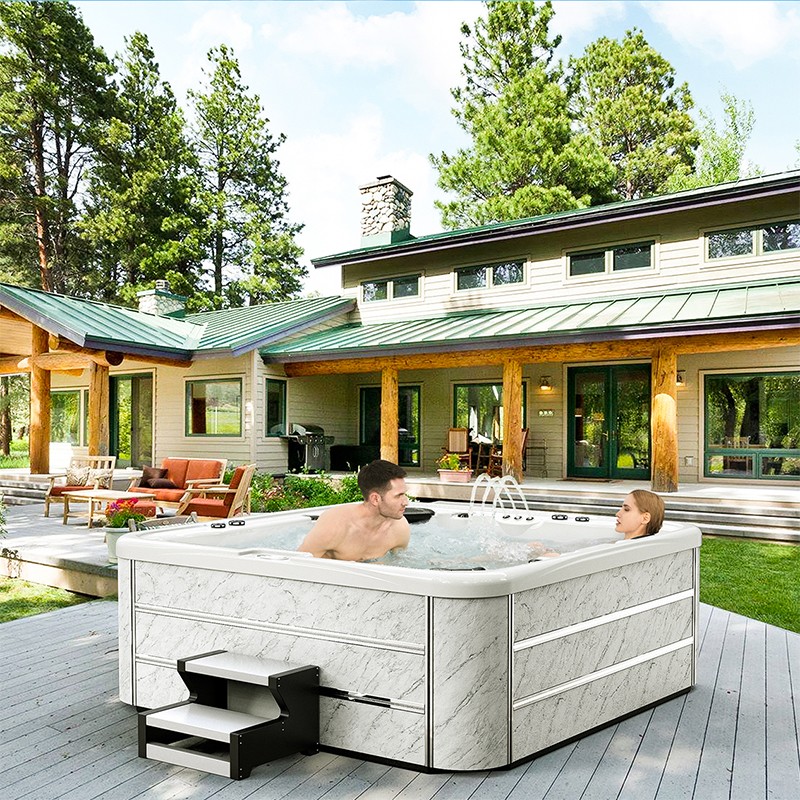
How to keep the water quality of the outdoor garden hot tub clean?
2025-06-07 15:35The outdoor garden hot tub is a luxurious leisure equipment that can not only bring physical and mental relaxation and soothing, but also add a unique charm to the courtyard. However, like any water facilities, outdoor spa bathtubs face an important problem during use-water quality maintenance.
Because it is exposed to the outdoor environment, the water in the garden hot tub is easily affected by external factors such as dust, leaves, insects, bird droppings, climate change, etc., which in turn affects the cleanliness of the water quality and the user experience.
In order to ensure that the water quality in the outdoor garden hot tub is always clean, safe and healthy, it is important to understand how to properly maintain the water quality. This article will discuss in detail how to keep the water quality of the outdoor garden hot tub clean, and conduct an in-depth analysis from the basics of water quality management, common problems, necessary water quality treatment methods and preventive measures.

The basis of outdoor garden hot tub water quality management
Water quality management is the key to keeping the water in the outdoor garden hot tub clear and healthy. The water in the garden hot tub contains a lot of water, chemicals, bacteria, algae and other components. Any improper management will lead to water pollution. Therefore, to maintain clean water quality, it is necessary to establish a scientific and reasonable water quality management system.
1. Water quality testing and monitoring
Regular water quality testing is the first step to ensure the clean water quality of the outdoor garden hot tub. The main indicators of water quality include water pH, hardness, chlorine content, total alkalinity, dissolved oxygen, etc. By using water quality testing tools, you can quickly understand whether the various indicators in the water are normal. If some indicators are not within the appropriate range, they need to be adjusted in time.
● pH value: The pH value of water in the outdoor garden hot tub should be maintained between 7.2 and 7.8. Too high or too low pH values will affect the cleanliness of the water and even irritate human skin.
● Chlorine content: Chlorine is a commonly used disinfectant that can effectively kill bacteria, viruses and other microorganisms in garden hot tub water. The right amount of chlorine content can keep the water clean, but too much chlorine can irritate the skin and eyes.
● Hardness: The hardness of water is usually determined by the calcium and magnesium ion content in the water. Hard water easily forms scale on the surface of the garden hot tub, while soft water may cause equipment corrosion. Therefore, hardness should be kept within an appropriate range.
● Total alkalinity: Total alkalinity is the sum of alkaline substances in water, which acts as a buffer and helps stabilize pH. The ideal total alkalinity should be maintained between 80 and 120 ppm.
By regularly monitoring these indicators, outdoor garden hot tub water quality problems can be discovered and solved in a timely manner.
2. Water filtration
Water filtration is a key link in keeping outdoor garden hot tub water clean. Spas are usually equipped with a filtration system to help remove impurities, bacteria, grease and other contaminants from the water. The filtration system usually includes multiple types of filters, such as paper filters, sand filters and carbon filters.
● Paper filters: This filter is usually used to remove larger particles in the water, such as mud, leaves, etc. They are suitable for short-term or lightly polluted water quality maintenance.
● Sand filters: Sand filters remove impurities in the water by physical filtration of particles. They are suitable for filtering large areas of water and are often used in larger outdoor garden hot tubs.
● Carbon filters: Carbon filters can effectively remove chlorine, ammonia, odors and other harmful substances from water. They can absorb organic pollutants in the water and provide a higher level of water purification.
Regularly cleaning and replacing these filters to ensure that they can operate efficiently is an important measure to keep the water clean.

Common water quality problems and solutions for outdoor garden hot tubs
Although using filters and regularly testing water quality can help keep the water clean, outdoor garden hot tubs may still face a variety of water quality problems during use. Here are some common water quality problems and their solutions:
1. Turbid water
Turbid water in outdoor garden hot tubs is usually caused by bacteria, algae, grease, or suspended matter. Grease may come from the user's skin secretions, cosmetics, skin care products, etc.; while bacteria and algae may multiply rapidly when water quality is not properly managed.
Solutions:
● Add the right amount of disinfectant: Use chlorine or other disinfectants to kill bacteria and viruses in the water and keep the water clean.
● Use detergent: Use a special garden hot tub water cleaner to remove grease and organic matter.
● Enhance filtration: Increase the efficiency of the filtration system, install a more efficient filter, or increase the frequency of filter cleaning.
2. Smelly water
Smelly water is usually caused by the presence of decayed organic matter in the water, such as skin flakes, moldy matter, or dirt that has not been cleaned up in time. In an outdoor garden hot tub, the warm environment promotes the rapid reproduction of bacteria and algae, which produces unpleasant odors.
Solutions:
● Change the water regularly: After long-term use, change the water regularly and clean the inside of the tub to remove accumulated dirt.
● Use a special water cleaner: Use a special cleaner for bathtub odor problems to clean the decayed matter in the water.
● Increase ventilation: Make sure the bathtub's filtration system is functioning properly and increase ventilation to help remove odors.
3. Algae in the water
The appearance of algae is usually caused by a lack of proper disinfection or sterilization measures in the water, especially on warm, sunny days, where algae is easy to grow. Algae not only makes the water cloudy, but can also cause irritation to the skin and eyes.
Solutions:
● Use algae inhibitors: Add algae inhibitors regularly to help prevent the growth of algae.
● Increase water flow: Enhance the water flow system of the garden hot tub and maintain the circulation of water flow, which will help reduce stagnant waters and reduce the breeding environment of algae.
● Clean the filter regularly: Algae can easily attach to the filter, so it is necessary to clean the filter regularly to prevent the accumulation of algae.
4. The hardness of the water is too high
The calcium and magnesium ions in hard water will be deposited in the hot tub and form scale. This will not only cause the surface of the outdoor garden hot tub to become dirty, but may also affect the efficiency of the heating system and even damage the equipment.
Solution:
● Use water softener: Water softener can effectively remove calcium and magnesium ions in the water and reduce the hardness of the water.
● Regularly remove scale: Use a descaling agent to clean the scale inside the bathtub to prevent scale accumulation.

How to prevent outdoor garden hot tub water pollution?
Preventing water pollution is more important than cleaning it afterwards. Here are some effective preventive measures to help you reduce water pollution and keep the garden hot tub clean and the water quality healthy.
1. Clean the bathtub regularly
Regularly cleaning the interior of the outdoor garden hot tub, including removing grease, dirt and sediment, can effectively prevent water pollution. When cleaning, focus on cleaning the bathtub's nozzle, pipe system, filter and other parts to ensure that every detail is kept clean.
2. Use a shower cap or swimming cap
Using a shower cap or swimming cap can effectively prevent hair, skin flakes and other substances from entering the water, reducing water pollution.
3. Limit the use of chemicals
Avoid using a large amount of skin care products, cosmetics, etc. before entering the garden hot tub, as these substances will increase the pollutant content of the water and cause the water quality to deteriorate.
4. Maintain the filtration system
Regularly check the working status of the filtration system to ensure that the filter can effectively remove impurities and pollutants in the water. Replace aging filters in time to maintain filtration efficiency.
5. Avoid bringing pollutants into the bathtub
Before entering the outdoor garden hot tub, try to wash off the dirt, grease, sweat, etc. on your body to avoid bringing these pollutants into the bathtub.

Lovia Spa is more than a supplier—we’re a global manufacturing partner for outdoor spas. Since 1989, we’ve offered full-service production, packaging, and delivery of spa equipment to importers around the world. Our low-cost pricing and high-end design appeal to spa retailers, hospitality groups, and private label brands. Request a factory quote today and take advantage of seasonal deals and discounted bulk pricing.
